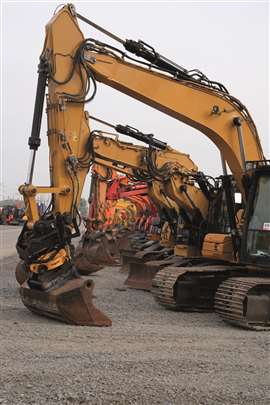Read this article in French German Italian Portuguese Spanish
Interview: Ritchie Bros. exec looks at used equipment markets and more
15 December 2023
Sam Wyant, president of international sales at Ritchie Bros., reveals his take on the used equipment and auction markets, progress for Rouse and SmartEquip, and the company’s approach to technology. IRN’s Lewis Tyler gives us an excerpt from their discussion.
 Sam Wyant, president of international sales, Ritchie Bros.
Sam Wyant, president of international sales, Ritchie Bros.
The used equipment market has seen challenges in recent times, not the least of which are high prices resulting from supply chain issues over the past few years.
At the same time, regions such as Europe and the Middle East have seen an economic slowdown, while other regions have reported a weakening in demand.
However, the supply chain crisis has eased somewhat and used equipment availability is increasing. This is good news for equipment auction companies like Ritchie Bros.
“We’re coming to a point where we’re seeing increased supply into the market based on both the work backlogs that are out there along with the original equipment manufacturers having caught up on some of their supply bottlenecks,” says Sam Wyant, president of international sales at Ritchie Bros., who joined the company in 2016 upon leaving Volvo Construction Equipment.
“We’ve come out of a period of tight constrained supply in the industry, and that’s what we see. When there’s an upcycle and the manufacturers can’t keep up with demand, then equipment supply becomes tight.
“As things start to moderate, and I’d say we’re in that moderation phase now, you start to see better equipment availability or the need to leverage additional channels for disposition.”
All this points to a healthy market, with companies now in a position to sell old machines and OEMs able to clear order backlogs for new launches.
Increased demand amid geopolitical conflicts
In its used equipment market trends report for Q3 of 2023, Ritchie Bros. noted a 28% increase in buyer demand for site dumpers in Europe through its Mascus online equipment listing service, when compared with 2022. Meanwhile, there was a 32% increase in the volume of site dumpers listed for sale on Mascus.
It’s a similar story for other types of equipment and in other regions.
However, Wyant stops short of predicting a sustained period of stability, pointing to unpredictable geopolitical environments; “If we take early October and what happened again in the Middle
 Supply is catching up on higher-volume construction equipment, according to Wyant.
Supply is catching up on higher-volume construction equipment, according to Wyant.
East, you’ve got some instability. You’ve got additional instability in Europe in addition to what had already started before the beginning of this year. That all drives some concern. You see a lot of economies taking dramatic fiscal action that’s trying to drive some reduction in inflation.
“History would say they’re trying to slow the economy, which would mean that eventually, you’ll see some impact on the construction side of things as well as residential, industrial and commercial.
“That should mean a bit of slowing, and we’ve got supply of equipment now into the marketplace that’s been very robust for a handful of years. To me, that means that you’ll have to find a way to balance that equipment supply out.”
In terms of equipment demand, the company is seeing higher demand for platform lifts and telehandlers, while also noting heightened buyer engagement in channels, leading to what Wyant describes as “pretty robust activity.”
“We can see that supply is catching up on higher-volume construction equipment,” Wyant says, “such as mid-size loaders and mid-size excavators. There seems to be additional supply available on some of those assets, but you still have a lot of niche assets where we’re hearing that supply is still tight. Large mining machines or mid-size mining machines seem to still be pretty tough to come by from an OEM standpoint.”
Physical and online auctions have their place
Wyant was speaking to IRN during the Moerdijk Live Xperience, Ritchie Bros’ first in-person event outside the US or Canada, post pandemic. While equipment auctions have historically taken place in settings like this, Ritchie Bros has continued to develop its remote auctions since introducing its online bidding service in 2002.
“We’ve been working over the past decade to drive more of an online and convenience orientation toward the process of selling equipment,” Wyant says. “We had seen a migration start where we had increased bidder activity online using the tools that were available to buy equipment.
“There was already a bit of a migration and then of course the pandemic required us to go fully online, which was a bit of a shift for the company, but because we had made those investments, we were able to continue on with our business.”
Wyant also observes that customers have become comfortable with online channels, which offers them a “very high level of comfort with the online bidding process.”
Despite this, he still notes a sustained high turnout at many of the company’s physical auctions; “We see still a lot of foot traffic on the inspection days. There’s a lot of customers that in addition to the investments we’ve made to bring better information to the online world, there is still a desire by many to come and see and touch the equipment. We have that (online) process but there has still been really good foot traffic post pandemic.”
Diversification to serve the entire life cycle of assets
Aside from its auction services, Ritchie Bros. has diversified its offering with a number of acquisitions in recent years. Two notable purchases are Rouse Services, a US-based specialist in used equipment and rental data, and SmartEquip, a platform facilitating parts procurement for rental companies and fleet owners, particularly across Europe, North America and Asia.
Wyant says its investment in the companies form part of a long-term goal to provide customers with a comprehensive suite of solutions across an asset’s entire life cycle; “For us, there’s different customer subsets that the tools offered by Rouse and SmartEquip are very important to.
“It’s about the concept of being involved and aligned with our mission to be alongside the customer through their whole journey from acquisition to disposition.”
The contributions of Rouse in this life cycle involve providing customers with insightful data on fleet performance, operational costs, optimal fleet utilization and more. In the case of SmartEquip, it can source spare parts for fleet owners via its ecommerce platform.
Then, at the disposal stage, Ritchie Bros. can offer its auction services either directly or through its IronPlanet business that it acquired in 2016.
Furthermore, Wyant says the companies are helping Ritchie Bros. to streamline business operations; “These are complementary tools to the transactional side of the business for Ritchie Bros., Rouse is its own entity and we’re also a customer of Rouse.
“It helps to give some of those macro trends and the macro understanding of the business. From a customer engagement perspective, we’re along the journey in a much better way with the customers from acquisition to disposition, but then there’s the additional benefits of us getting some insights on the macro side that help us guide the business.”
Evidence of this can be seen in the previously mentioned monthly market trends report, which provides insight into a number of industries and equipment types, covering regions like the Middle East, North America, Australia and Europe.
Push to bring Europe up to speed
 SmartEquip is already deeply rooted in Europe, with companies such as Boels, Loxam, Zeppelin, Wacker Neuson and Kiloutou all users.
SmartEquip is already deeply rooted in Europe, with companies such as Boels, Loxam, Zeppelin, Wacker Neuson and Kiloutou all users.
The strategy for solutions and services is to establish a presence in the European market. To achieve this, the company appointed James Atkinson as the vice president of Rouse & SmartEquip EMEA earlier this year.
Speaking to IRN in Moerdijk, Atkinson said the companies have been able to benefit from their association with Ritchie Bros., enabling them to “open doors and engage with the right people.”
On its own merit, Rouse is in the midst of transitioning its rental benchmarking tool, which has been available in North America for more than a decade, to Europe.
“They’re making good progress in helping the customers to understand the value of the tools and building those relationships,” Wyant says.
“As we made those acquisitions during the pandemic, we were hampered coming out of that, but we’ve ramped up and invested in the team. It’s a real strategy of ours to help our international customers in the same way they’re helping their customers in North America.”
Meanwhile, SmartEquip is already deeply rooted in Europe, with companies such as Boels, Loxam, Zeppelin, Wacker Neuson, and Kiloutou all users.
Wyant says the satisfaction among customers regarding productivity gains and optimized technician and fleet utilization shows that the company is beginning to make its mark on the European market, despite still being in the early stages of penetration; “The customers that they’ve engaged with have been very happy with the productivity gains that they’ve had and how they’ve been able to maximize use of time of the technicians and a fleet in that process.
“It’s been mostly large fleet owners that have engaged and seen the real benefit there, so I know they’re working hard. We’ve got some really large rental customers and those customers I’ve talked to that are engaged in SmartEquip, they swear by it.
“We had one customer that told me it would be a detriment. They’d potentially lose technicians if they were to change the process and not have that tool available. That’s how much of a difference it’s made in the day-to-day business.”
The next phase involves merging various lifecycle management services and disposition solutions into a unified platform, which is an ongoing project.
STAY CONNECTED



Receive the information you need when you need it through our world-leading magazines, newsletters and daily briefings.
CONNECT WITH THE TEAM









